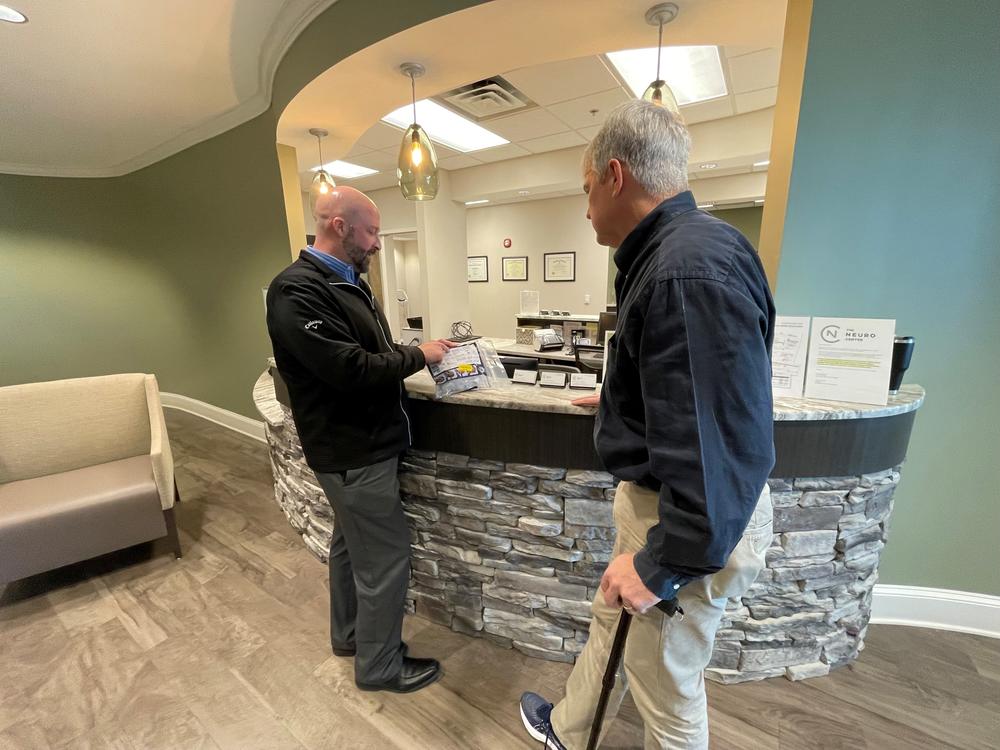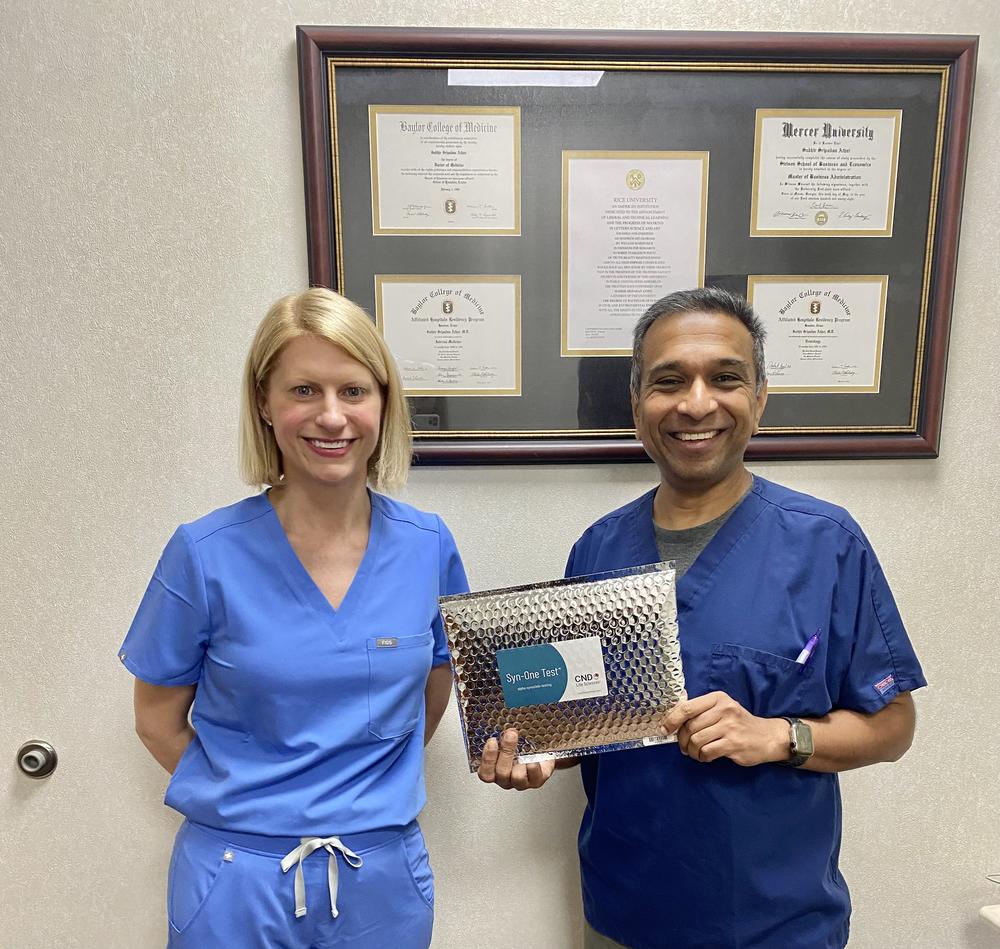
Caption
Dr. Daniel Cobb and Chris Griffin, a patient at the Neuro Center in Gainesville who was diagnosed with Parkinson's disease with the Syn-One test.
Credit: Ellen Eldridge / GPB News
|Updated: January 10, 2024 11:01 PM

Dr. Daniel Cobb and Chris Griffin, a patient at the Neuro Center in Gainesville who was diagnosed with Parkinson's disease with the Syn-One test.
When Chris Griffin, an Atlanta HVAC technician, started having pain in his hands, he sought help from his doctor.
That doctor thought the pain might be carpal tunnel syndrome, but a test ruled it out.
Then the COVID-19 pandemic hit.
Griffin didn’t think much more about his hands until he started having tremors and issues with his balance over the summer of 2021.
“I went to see the Van Gogh exhibit in Atlanta and noticed that I could not stand in front of a painting and actually take it in and look at the painting without feeling like my balance was off,” Griffin said. “I could walk normally, but I couldn't stand in one place for any length of time. And at that point, I knew something was wrong.”
Griffin said his primary care doctor suggested “postural instability” and let the word “Parkinson’s” drop with a referral to a neurologist.
Parkinson's disease, a movement disorder, has traditionally been diagnosed clinically.
That means a doctor conducts a physical examination that doesn’t include laboratory tests or bloodwork.
Dr. Daniel Cobb, the owner of The Neuro Center in Gainesville, is the only doctor in northern Georgia to use a new skin biopsy test to more accurately diagnose Parkinson’s earlier rather than later in the disease progression.
Cobb’s practice provides medical treatment for neurological conditions and sleep disorders, as well as medical research for both.
He tested Griffin using the Syn-One Test last November, after learning about the test at a medical conference.
That’s when Cobb began researching the test by talking to the people who invented it and reading the medical literature about how it works.
The minimally invasive technique involves taking three skin punch biopsies. Cobb said he performs the procedure in 10 to 15 minutes in his office, and gets lab results back within six weeks.
“In the past, sometimes you had to follow the person for several years before you could definitively say, ‘Yes, you have Parkinson's disease,’ or you would even have to give them medication and wait several months to see if it works,” Cobb said.
After scientists discovered a link between alpha-synuclein protein in the appendix and gut of patients who developed Parkinson’s, in 2020, the U.S. National Institutes of Health National Institute of Neurological Disorders and Stroke awarded Cutaneous NeuroDiagnostics (CND Life Sciences) a $2.4 million grant to advance development of its Syn-One Test for diagnosing Parkinson’s and other diseases.

Meredith Parrish (left) and Dr. Sudhir Athni with the Syn-One Test.
Dr. Sudhir Athni, a Macon-based neurologist, said CND Life Sciences Regional Sales Director Meredith Parrish visited Athni's practice in June 2021 to recognize him as the first doctor in Georgia to use the now commercially available Syn-One Test.
CND’s test confirms the presence of alpha-synuclein, which is a pathogenic hallmark of a group of neurodegenerative disorders including Parkinson’s disease, multiple system atrophy, dementia with Lewy bodies and pure autonomic failure.
“This may be a spectrum where if you have this alpha-synuclein protein in one part of the brain, then you get Parkinson's,” Athni said. “If you have alpha-synuclein in other parts of the brain, you may have another clinical disease such as diffuse Lewy body dementia.”
In the past, the movement disorder and dementia disorder were considered distant cousins, but not really the same disease, Athni said.
Even though the Syn-One test isn’t 100% accurate, a near-definitive diagnosis brings patients, and their doctors, peace of mind.
“I think the most important is getting the diagnosis for peace of mind for the patient,” Cobb said. "Then laying out a treatment option that we can do as well as just telling them more about the prognosis and what to expect down the road.”
The only thing worse than Parkinson's is having Parkinson's and not being able to tell people you have Parkinson's, Griffin said.
Living with symptoms of unknown origin made Griffin feel like he had to pretend everything was OK.
“When I got the diagnosis, it was a relief,” Griffin said. “I mean, because, now (that) I could name my demon, I could fight my demon.”
The prognosis for Parkinson’s is better now than it was, Cobb said. People can live decades with the condition.
“Of course, they can start with tremors in their hands and then it can progress to other physical symptoms such as, you know, difficulty with their balance, shuffling their gait, just slowing down in general,” Cobb said. “But with today's medicine, most people live a normal lifespan. Most people work a normal career.”